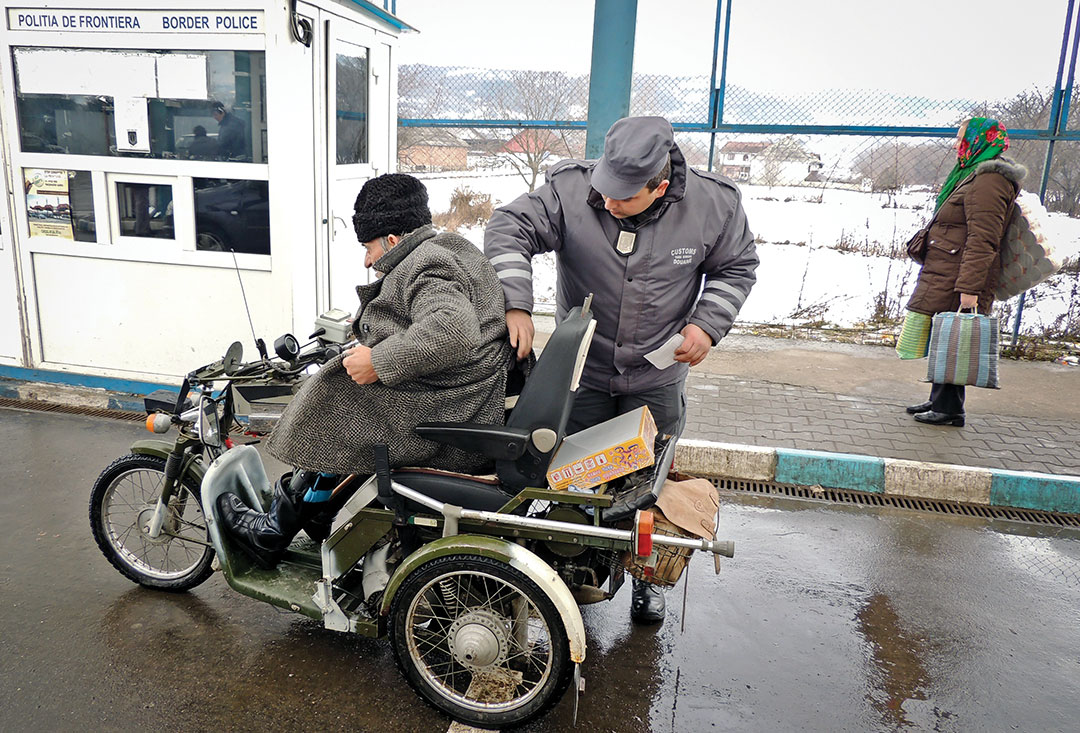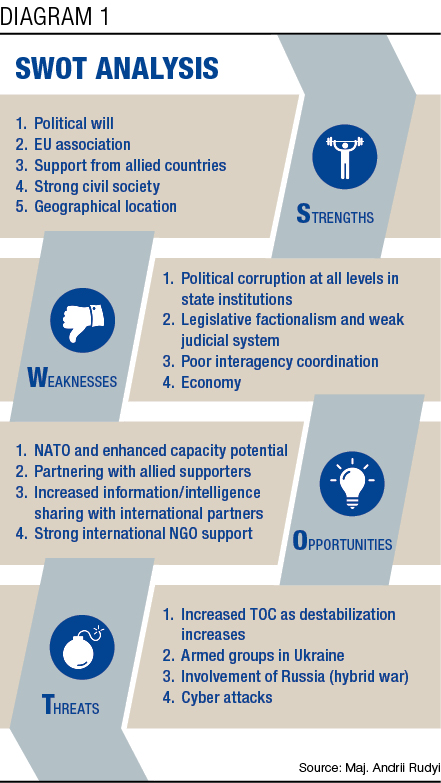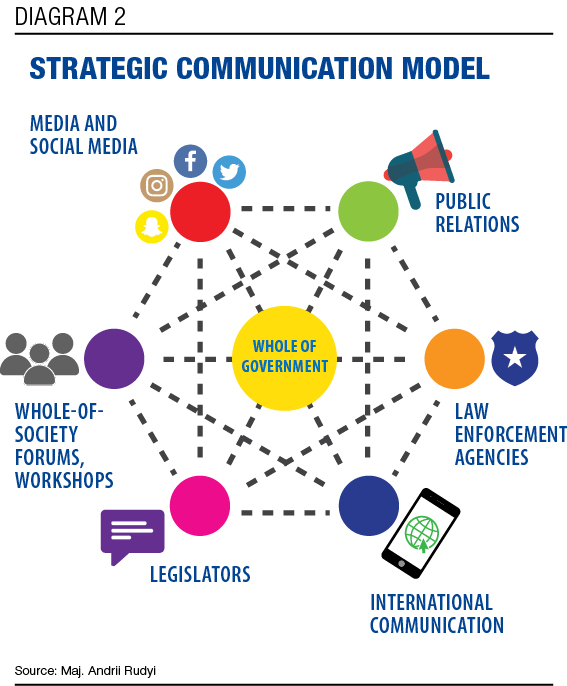Ukraine develops a comprehensive national strategy to counter organized crime
By Maj. Andrii Rudyi. Organized crime and corruption analyst, Security Service of Ukraine
A well-coordinated and organized response that sufficiently empowers state institutions to be free from corruption — in partnership with civil society and the international community — is essential when trying to increase security and public safety. This statement best describes Ukraine’s strategy for combating organized crime.
The fight against organized crime is one of the country’s major challenges. Organized crime violates the fundamental values of civil society; it impedes economic, social, cultural and political development, contradicts the principles of the rule of law and threatens the security of the country and region. The implementation of a correct government policy ensures the formation of a democratic, social and legal state. The implemented reforms and accompanying legal and institutional changes define the challenges and needs on a national level, which is a prerequisite for a country’s continued development.
The goal of Ukraine’s policy for fighting organized crime is to create, by 2022, the legal and institutional space that will ensure sustainable achievements. This means ensuring that citizens live in a peaceful and secure environment and enjoy the protection of legal rights and democratic standards. This leads to the prevention of crime, the strengthening of cooperation at the international level, and the establishment of close and trusted relationships with the public.
In accordance with these goals, the vision statement of the National Strategy of Ukraine for Combating Organized Crime is: “Diminish the effects of transnational organized crime (TOC) on Ukraine from the level of a national security threat to a public safety issue.”
Outcomes and risk assessment
Reforms implemented as a result of correctly defined policies ensure that steadfast results are achieved in the fight against organized crime, in crime prevention and when protecting public values.
Ukraine’s geographical location is strategically important for organized crime groups and increases the threat from TOC. Ukraine has been used recently as a transit corridor, sometimes for the transport of migrants by organized groups. The existence of occupied territories in Ukraine increases the prospect of illegal migration by fostering a favorable environment for organized crime groups.

The region’s political instability, the occupation of Ukrainian territories, and the existence of conflict zones where the state’s jurisdiction does not apply, negatively impact state security and the social and economic status of the country. The potential dissemination of conflicts presents a favorable climate for organized crime groups within and outside of the country because political instability and occupied territories increase the risk that criminal entities will establish a foothold, requiring complex responses by the state.
In the case of Ukraine, after researching the strategy development process — in particular the threat assessment, capabilities assessment and the strength, weakness, opportunity and threat analysis (diagram 1) — the best strategy to counter organized crime is a coercive, whole-of-government model led by the prime minister’s office.
Institutional Framework
In the fight against organized crime, great importance is given to close, effective, consistent and results-oriented interagency coordination. By government decree, in Ukraine the Interagency Coordinating Council for Combating Organized Crime is authorized to prepare proposals and recommendations for the development of a unified strategic approach by the state, taking into account the principles of the rule of law and human rights. Interagency coordination will encourage the participation of nongovernmental organizations (NGOs), international organizations, scientists and experts. The coordinating council will unite six agencies:
- Ministry of Internal Affairs
- Security Service of Ukraine
- National Anti-Corruption Bureau (NABU)
- State Bureau of Investigations
- Office of the General Prosecutor
- State Fiscal Service of Ukraine
The council organizes intergovernmental and internal-level meetings and conferences. Effective and consistent cooperation depends on the principle of transparency.
Approval and implementation
Implementing the strategy depends on achieving these main goals:
- Establish an effective national anti-corruption mechanism.
- Foster an independent and transparent judicial branch to prosecute TOC.
- Reduce/diminish/manage TOC in all its manifestations.
- Improve domestic and international counter-TOC cooperation and coordination.
The draft strategy is meant to maintain the success achieved in the fight against organized crime and to improve existing mechanisms. Its implementation will be coordinated by the Interagency Coordinating Council, which will be developed in two stages over four years. Funding will be provided by the state and by donor organizations and partner countries.
The National Strategy for Combating Organized Crime is a protean document, and changes will be based on the challenges identified during its implementation. While implementing this strategy, it is very important to engage all the key players. The best tool to achieve that goal is strategic communication (diagram 2). The strategic communication model is based on whole-of-government, whole-of-society and whole-of-international-society approaches.
In the whole-of-government approach, the platforms for communication will be the government of Ukraine and the Interagency Coordinating Council for Combating Organized Crime. These two entities represent all key players and will make possible the successful implementation, monitoring, measuring and adjustment of the strategy.
The responsible entity for the whole-of-society approach will be the Ministry of Information Policy. It is critical that the public hears a consistent message about the government’s efforts to combat TOC. The government must share results, steps, goals and activities with the public via all media resources. By involving academia, experts and NGOs, and by holding forums, workshops and conferences, the state can gather public feedback to better adjust its strategy.
Finally, the whole-of-international-society approach must show that Ukraine is standing hand in hand with the rest of the world to fight TOC.
Monitoring and evaluation
Monitoring, reporting and evaluation is an integral part of the policy process. The strategy will be monitored by the annual performance report, though it may be prepared quarterly based on performance indicators. The report should provide the status of goals and objectives and briefly describe the main achievements and reflect the main outcomes of the policy.
The secretariat of the Interagency Coordination Council will coordinate the annual report preparation. The agencies responsible for achieving the goals and implementing the activities will submit information to the secretariat, which will prepare a report for implementing the strategy and action plan.
The secretariat will produce a final assessment with conclusions and recommendations for a comprehensive policy and submit it to the government.
Implementing this national strategy to combat organized crime will ensure the country’s sustainable development. It will advance public security, economic stability, social justice and pride for Ukraine in Europe and the world.




Comments are closed.